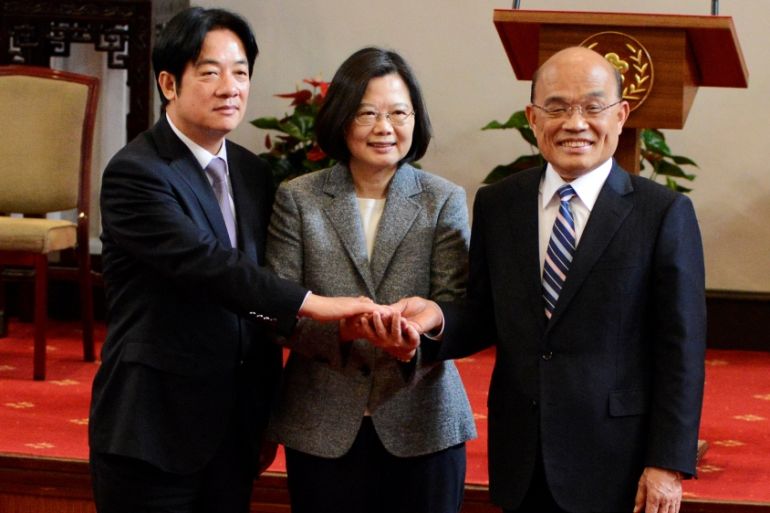Taiwan: Tsai names new premier after resignation over poll losses
Su Tseng-chang vows to lead administration amid challenges and learn from earlier mistakes.

Taiwan‘s President Tsai Ing-wen has named the ruling pro-independence party’s former chairman as premier after the incumbent stepped down along with the entire cabinet in the wake of a setback in local polls.
The election losses in November presented a major challenge to Tsai, who came under criticism at home over her reform agenda while facing renewed threats from China, which considers self-ruled Taiwan a breakaway province.
Tsai on Friday appointed Su Tseng-chang, the former chairman of the Democratic Progressive Party (DPP) for two terms, who succeeds William Lai.
“Taiwan’s democracy and development must face certain challenges,” Tsai said, adding that China was looking to force its “one country, two systems” structure on the island.
Taiwan’s premier forms the cabinet and runs the government on a day-to-day basis.
Su vowed to lead the administration amid the challenges and learn from earlier mistakes. “The situation is difficult and the task is tough,” he said.
His appointment followed the resignation of Lai, the second premier to quit since Tsai took office in 2016, in line with a practice of leaders quitting when their party loses a major election.
“I must resign to take responsibility for the election defeat,” Lai, who had taken office in September 2017, told a cabinet meeting earlier on Friday.
Two months ago, Tsai immediately resigned as chair of the DPP after it won just six out of 22 local authorities while the opposition Kuomintang (KMT) party, seen as being close to China, took 15 cities and counties.
|
|
With just about a year until the next presidential election, analysts say Tsai and the new premier need to shore up public support for the government’s policy on relations with Beijing and further boost the island’s export-reliant economy in a challenging year amid a China-US trade war.
Su was appointed premier in 2006 by former president Chen Shui-bian, who infuriated Beijing and strained Taiwan’s relationship with the United States during his tenure from 2000 to 2008.
Su, who is popular among the DPP’s core supporters, has led Taiwan’s most populous New Taipei City for years. He was defeated by a candidate from the KMT in November.
Tsai has said her administration would reflect upon the election defeats but would stand firm to defend Taiwan’s democracy in the face of renewed Chinese threats.
Chinese President Xi Jinping, who has stepped up pressure on Taiwan since Tsai became president, threatened earlier this month to use force to bring the island under Beijing’s rule and urged “reunification”.
“The new premier not only has to focus on domestic matters but must also pay much more attention to cross-strait and national security issues,” Yao Chia-wen, a senior adviser to the president, told Reuters news agency.
He said the new premier must deal with issues including the prevention of swine fever from China, as well as possible election interference.
Some from within the embattled leader’s party have urged Tsai not to seek re-election. She has not explicitly said whether she would run for president in 2020 but has warned against Chinese efforts to interfere with elections.